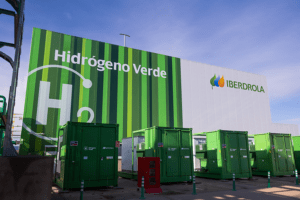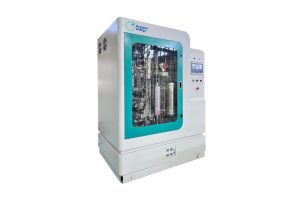Discovering non-iridium catalysts for commercial applications has been challenging, as novel materials often degrade rapidly under the harsh acidic conditions of the oxygen evolution reaction (OER). The best iridium-free catalysts known to date offer lifetimes of approximately 1,000 to 1,400 hours. With a baseline of over 4,000 hours of continuous operation thus far, H2U’s iridium-free catalysts, tested at 10x higher current density, are demonstrating projected lifetimes of over 25,000 hours. H2U catalysts are projected to last at least six years for targeted applications, such as in PEM electrolyzers paired with curtailed renewables.
Why catalyst durability is important
As the hydrogen economy grows and the demand for hydrogen increases, maintaining catalyst performance without relying on iridium becomes even more critical. Durable catalysts enable the scalability of hydrogen production and utilization technologies by reducing the frequency of replacements and associated costs.
The reliance on iridium has raised industry concerns, as the U.S. Department of Energy has recently categorized iridium as the sole material in the hydrogen sector at high risk of supply disruptions.
H2U’s innovative catalysts are cost-effective and more readily available than iridium. Utilizing these affordable alternatives expands the possibilities for electrolyzer stack design, enabling H2U to explore avenues unrestricted by ultra-thin catalyst layers and low usage of catalysts. This flexibility significantly reduces capital expenses, producing more affordable delivered hydrogen.
“Our talented scientists and engineers have achieved an exceptional breakthrough with rigorous testing of various families of alternative lower-cost compounds,” said Mark McGough, H2U’s President and CEO. “The discovery of relatively earth-abundant materials using our Catalyst Discovery Engine™ (CDE™) has demonstrated a projected lifetime of 25,000 hours in ongoing tests, a milestone previously considered unattainable without iridium. As these successful trials continue, we expect to attain further breakthroughs.”
H2U’s Senior Catalyst Engineer, Dr. Michael Mazza, remarked: “This achievement of a 25,000-hour lifetime is the best durability number we’ve seen for an iridium-free catalyst in a PEM electrolyzer. Our CDE team found promising catalysts and developed a unique process to integrate the materials into membrane electrode assemblies to optimize activity and durability. This discovery not only represents a technological leap but also contributes significantly to addressing the global need for sustainable hydrogen production. We are excited about the potential impact of our team’s ongoing scientific discoveries on the clean energy landscape.”
H2U’s discovery and testing of durable non-iridium catalysts has the potential to lower the upfront costs of electrolyzers significantly. This becomes especially important in the coming years, as the limited availability of iridium will result in shortages and significant price hikes, posing a major obstacle to a swift transition to cleaner energy, according to the company.






